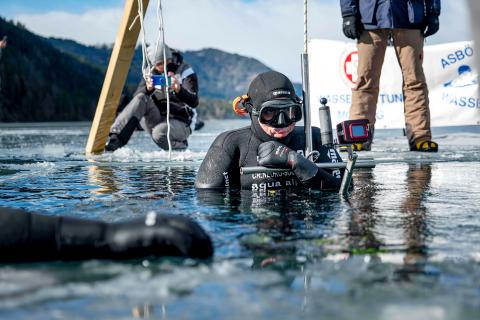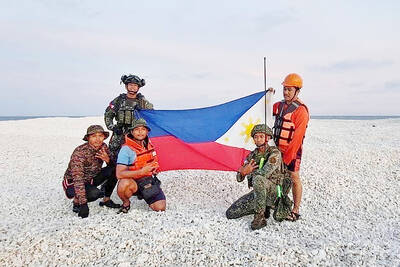It was not the way that Christian Redl’s latest deep-diving record attempt was meant to end: being hauled to the surface of Austria’s frozen Weissensee after losing consciousness in the icy waters.
Redl — dubbed the “Iceman” — experienced a blackout, something he sees as par for the course in his quest to break the record for the deepest dive under ice.
“For me, it’s not risky or dangerous. It just happened,” the 43-year-old said matter-of-factly after his unsuccessful record attempt on Friday last week.

Photo: AFP
The Austrian, who has had similar blackouts before, is part of a small group of freedivers in the world specializing in diving under ice.
His aim was to dive 71m deep into the Weissensee — itself covered in 30cm of ice — braving the 2°C water in just a wetsuit and fins.
However, exerting himself excessively on the way up resulted in a lack of oxygen to the brain, which caused a blackout.
He was dragged up by one of his six safety divers and pulled onto the ice where a waiting medical team sprang into action with an oxygen mask.
It is the latest chapter in a life dominated by a passion for diving that began at the age of six when Redl’s uncle gave him fins and a mask as a present.
They were put to use snorkeling on a Vienna Lake, before he started scuba diving at the age of 10.
Seven years later, he saw The Big Blue — French director Luc Besson’s film about the friendship and rivalry between two freedivers.
“This movie changed my life completely because my biggest dream was to become like Jean Reno in this movie, a world record holder,” Redl said.
However, work commitments meant that he only had the winter months to attempt records, which led to him to specialize in ice diving, earning him his “Iceman” moniker.
At 30, he quit his job as an investment banker to become a professional freediver, supporting himself with teaching and occasional acting work.
His ability to hold his breath under water for up to six minutes has given him a somewhat macabre niche of drowned corpse roles.
His first record came in 2003, a 90m horizontal distance dive under ice.
In preparation for his latest attempt — perhaps surprisingly — Redl only did one practice dive on the Weissensee itself, otherwise sticking to an indoor pool on the outskirts of Vienna.
“I do everything with my mental strength, so I really don’t care about the cold,” he said before the attempt on Friday.
New Zealand freediver and rival Ant Williams, the holder of the record Redl wanted to clinch, understands the challenges only too well.
“The water is not only freezing cold, it is pitch black and foreboding,” he said by e-mail.
“It is far more intimidating and uncomfortable than normal diving,” Williams said, adding that he regards his Austrian rival as “talented” and “more than capable of pushing the record deeper.”
As for his hardest dive to date, Redl said that came on Nepal’s Gokyo Lake at an altitude of 5,160m, requiring him to undertake six months of training to deal with the lack of oxygen.
“The first 10 doctors said ‘it is impossible, you will die,’” Redl said. “The 11th one said: ‘Yes, you will die, but it’s a cool project.’ So I concentrated on the second part of this sentence.”

Kehinde Sanni spends his days smoothing out dents and repainting scratched bumpers in a modest autobody shop in Lagos. He has never left Nigeria, yet he speaks glowingly of Burkina Faso military leader Ibrahim Traore. “Nigeria needs someone like Ibrahim Traore of Burkina Faso. He is doing well for his country,” Sanni said. His admiration is shaped by a steady stream of viral videos, memes and social media posts — many misleading or outright false — portraying Traore as a fearless reformer who defied Western powers and reclaimed his country’s dignity. The Burkinabe strongman swept into power following a coup in September 2022

TRUMP EFFECT: The win capped one of the most dramatic turnarounds in Canadian political history after the Conservatives had led the Liberals by more than 20 points Canadian Prime Minister Mark Carney yesterday pledged to win US President Donald Trump’s trade war after winning Canada’s election and leading his Liberal Party to another term in power. Following a campaign dominated by Trump’s tariffs and annexation threats, Carney promised to chart “a new path forward” in a world “fundamentally changed” by a US that is newly hostile to free trade. “We are over the shock of the American betrayal, but we should never forget the lessons,” said Carney, who led the central banks of Canada and the UK before entering politics earlier this year. “We will win this trade war and

‘FRAGMENTING’: British politics have for a long time been dominated by the Labor Party and the Tories, but polls suggest that Reform now poses a significant challenge Hard-right upstarts Reform UK snatched a parliamentary seat from British Prime Minister Keir Starmer’s Labor Party yesterday in local elections that dealt a blow to the UK’s two establishment parties. Reform, led by anti-immigrant firebrand Nigel Farage, won the by-election in Runcorn and Helsby in northwest England by just six votes, as it picked up gains in other localities, including one mayoralty. The group’s strong showing continues momentum it built up at last year’s general election and appears to confirm a trend that the UK is entering an era of multi-party politics. “For the movement, for the party it’s a very, very big

The Philippines yesterday slammed an “irresponsible” Chinese state media report claiming a disputed reef in the South China Sea was under Beijing’s control, saying the “status quo” was unchanged. Tiexian Reef (鐵線礁), also known as Sandy Cay Reef, lies near Thitu Island, or Pagasa, where the Philippines stations troops and maintains a coast guard monitoring base. Chinese state broadcaster CCTV on Saturday said that the China Coast Guard had “implemented maritime control” over Tiexian Reef in the middle of this month. The Philippines and China have been engaged in months of confrontations over the South China Sea, which Beijing claims nearly in its